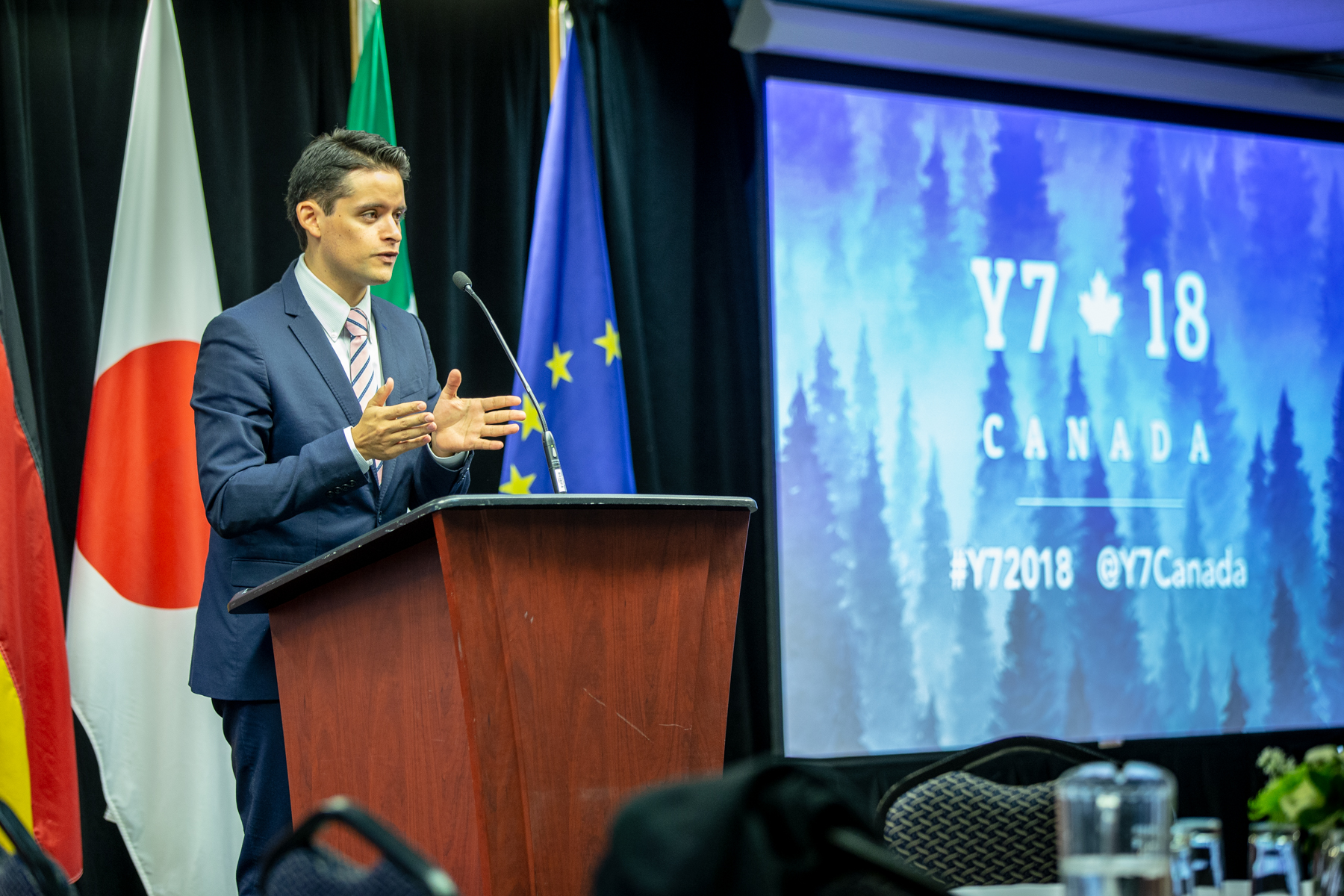By: Diego Reyeros (MPP, BPG Partner)
As one of the official engagement groups of the Group of 7 (G7), the Youth 7 Summit (Y7) has historically had the role of pushing a youth-centred perspective of the topics discussed every year by the heads of state of these influential countries. Under the Presidency of the Canadian Government and the coordination of Young Diplomats of Canada, a nonpartisan youth-led non-profit that develops Canada’s future leaders in policy, diplomacy and advocacy, this year’s Y7 Summit achieved three important milestones:
It implemented innovative methodologies for policy-making, utilizing tools and dynamics that are aligned with the preferences of today’s youth.
It yielded bold, pragmatic and inclusive policies developed by youth in three policy areas – Gender Equality, Climate Change and the Future of Work.
It placed the perspectives of youth at the highest levels of the G7 debate.
Here’s an overview of these milestones.
Renovated methodology – Youth Diplomacy 2.0
Whenever youth is included in the creation of policies, whether at a local, national or international level, governments and organizations tend to utilize the same structures, tools and methodologies used within their own decision making processes. Often, this translates into rigid, hierarchical and often adversarial ways of consensus building. The reality is that the current generation of young people is not necessarily compatible with these approaches. Driven by the digital age, today’s youth are more informed, have a global and holistic perspective, and are constantly looking for ways to get their ideas heard through unconventional channels (ie. social media, entrepreneurship, civic tech, etc).
For this reason, we developed the negotiations of the Y7 Summit with collaboration as the driving force. In short, we incorporated Design Thinking, a methodology mostly used for product development in the start-up and tech ecosystems, into the diplomatic spectrum. Instead of asking delegates to exchange ideas, develop strategic partnerships and build consensus through adversarial debates, the delegates were asked to bring a completely collaborative perspective. First, delegates identified key issues by conducting nation-wide online consultations with youth. At the summit, the 36 delegates developed a shared future vision for each priority theme. Through collaborative brainstorming and discussion sessions, the delegates then agreed on very specific policy actions needed to achieve their future visions.
At first, the idea seemed bold. Especially since most international summits, such as the G7, use structured debates, specialized working groups and rules of order to ensure that the debates are conducted in an orderly manner. However, I believe the results of the summit speak for themselves. The delegates were able to create a concise, specific and relevant Call to Action, which was achieved through a process of complete consensus. This demonstrates that innovative approaches to policy development not only open a new door for youth participation, but that they actually capitalize on the strengths of this generation.
[At this point, I must share that the methodology used for the negotiations are a great example of the potential that the Chevening Alumni Network has. I was only able to develop the methodology used at the Y7 Summit thanks to a conversation with a fellow Chevener, Manuel Meneses, who shared valuable insights and practices from the work done by his innovation-consulting firm, Cirklo. This conversation turned out to be the inspiration behind this methodology.]
Bold, Pragmatic and Inclusive policy actions
After 4 days of passionate deliberations, the 36 young delegates representing the G7 member states, the European Union, Charveloix (host region of the G7 2018) and Canada’s National Indigenous Youth Council, sent a strong message to the G7, urging them to act on the following:
Gender Equality: Responding to Recent Movements Vocalizing Sexual Assault & Gender-Based Violence
To appoint an empowered Special Advisor to the Head of Government for Freedom from Sexual Assault, Harassment, and Gender-based Violence & for Sexual Health.
Climate Change: Saving All Bodies of Water through Immediate Action on Plastics
To fully ban microplastics in cosmetics with ambitious targets to quickly phase out other harmful plastics, and
To establish a G7 working group that generates innovative ways to protect bodies of water, such as legal rights, expansion of protected areas, & the creation of a list of endangered waters
Future of Work: Enshrining Data Privacy as a Human Right
To clearly articulate that the human right to privacy includes full ownership of personal data, even when data are used and modified by non-human entities for profit.
These policy actions were shared at a high-level debate between the Y7 Head Delegates and the G7 Sherpas (personal representatives of the heads of state). Additionally, the Call to Action (visit the document here) was shared with the G7 Presidency through an official handover session led by Patty Hajdu, Canada’s Minister of Employment, Workforce Development and Labour. Additional follow-up advocacy meetings are scheduled through the remaining of 2018 both within the activities of the G7 and with each member country.
Youth at the highest levels of international governance
The multi-sectorial nature of this year’s Y7 summit has been exemplary and has set the new standard for any future efforts to promote youth participation within the G7 member countries and beyond. I believe there are a few key takeaways from this summit, which should be considered by government across the globe.
Youth as a priority for the executive branch – The view that the Canadian government has towards youth in all aspects of the public sector, including policy-making, is unique. On top of holding the title of Prime Minister, Justin Trudeau self-appointed himself as Minister of Youth, giving this generational group a central role in his government. Additionally, under the Canadian Presidency, this is the first year the Y7 is considered an official engagement group of the G7, which allows for truly impactful advocacy efforts.
Providing strong financial and public support – From opening the doors of 111 Sussex, an official complex of Global Affairs Canada, to ensuring the participation of relevant decision makers and providing wide-reaching media coverage, the Y7 received all the support for it to be an impactful summit.
Engage, engage, engage – The inclusion of cross-sectorial actors was vital to build the right platform for the Y7. From holding consultations with civil society, to running promotion campaigns with the private sector, the summit ensured that everyone’s perspective was heard.
Letting them lead – At no point of the process did the G7 Presidency hesitate in letting youth lead the way. On the contrary, they provided the tools, space and encouragement so that Young Diplomats of Canada could develop a relevant agenda, an inclusive debate and a strong Call to Action.
Hopefully, we are on our way to seeing these innovative methodologies of including youth within the efforts of national and local governments. It is time to evolve into a bold, pragmatic and inclusive approach of doing policy, as this is the only way through which we will ensure that the relationship between government and society will be stronger in the future.
In August 2018, the Y7 counterpart at the G20 Summit, the Y20, will take place in Cordoba, Argentina. On behalf of all the youth involved in the Y7 2018, we hope the Y20 serves as the next step to this new vision of youth participation and innovative forms of policy-making.

